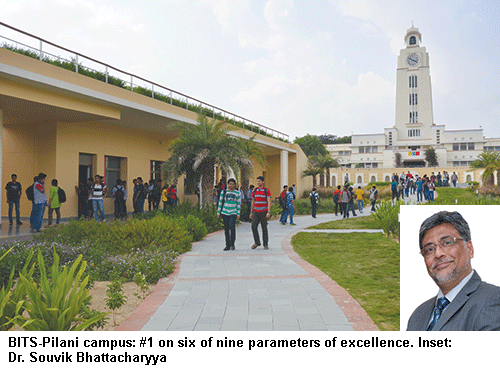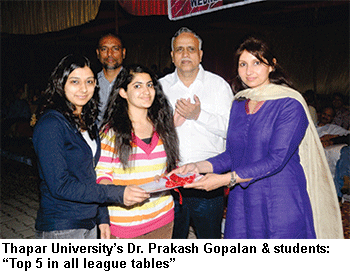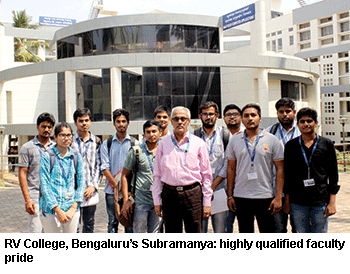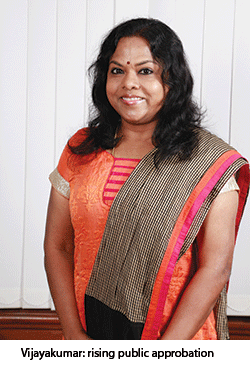With almost 80 percent of the 3,470 engineering institutions promoted and managed by private entrepreneurs, it makes good sense to evaluate and rank the Top 100 private engineering institutes to enable parents and students to choose the most suitable from among them - Summiya Yasmeen
 Although India’s 3,470 engineering colleges certify more graduates than any other country worldwide, the future isn’t bright for the 1.5 million students who will graduate next month (June). Eager campus recruiters offering six-digit salaries are now folklore and history. The great majority of engineering graduates are likely to accept low-end jobs incommensurate with their formal qualifications, and a substantial number is likely to augment the pool of India’s 40 million educated unemployed.
Although India’s 3,470 engineering colleges certify more graduates than any other country worldwide, the future isn’t bright for the 1.5 million students who will graduate next month (June). Eager campus recruiters offering six-digit salaries are now folklore and history. The great majority of engineering graduates are likely to accept low-end jobs incommensurate with their formal qualifications, and a substantial number is likely to augment the pool of India’s 40 million educated unemployed.
According to several surveys and studies (Nasscom-McKinsey 2005, Aspiring Minds 2016), over 75 percent of the country’s engineering graduates are unemployable in Indian and foreign multinationals. In particular, the National Employability Report 2015-16 of the Delhi-based Aspiring Minds Assessment Pvt. Ltd — an employability evaluation and certification company — indicates that 80 percent of engineers churned out by the country’s engineering and technology institutions every year are unemployable in IT companies.
It’s now generally accepted that the prime cause of this snowballing unemployability crisis and huge variation in quality and standards of engineering education countrywide, was indiscriminate licencing of engineering colleges by the Delhi-based All India Council for Technical Education (AICTE) during the past decade. Their number countrywide has almost tripled from 1,511 in 2006-07 to 3,470 in 2016-17. The fallout of the mushroom growth of engineering institutes — most of them privately promoted — is that in the academic year 2015-16, almost 50 percent of the total seats available (1.6 million) in engineering colleges across the country were vacant.
With engineering education in India in deep crisis, in 2013 EducationWorld took the lead to publish pan-India rankings of the country’s most respected engineering colleges excluding the Central government-promoted Indian Institutes of Technology (IITs), which are leagues ahead of other engineering colleges and monotonously top all media rankings. Given that a mere 1 percent of the 1.5 million school-leavers who write the IIT-JEE (joint entrance examination) annually, are admitted into these elite institutes, your editors ab initio felt the public interest would be better served by eliminating the IITs from our rankings, and ranking the remainder inter se.
In 2016, we took this logic a step further and eliminated all government-promoted colleges including the Central government-funded National Institutes of Technology (NITs) and highly subsidised state government engineering colleges from our annual rankings exercise. Moreover, with almost 80 percent of the 3,470 engineering colleges promoted and managed by private entrepreneurs, it made good sense to evaluate and rank the country’s Top 100 private engineering colleges to enable parents and students to choose the most suitable from among them.
“The gap between the curriculums of engineering colleges and industry requirements is widening by the day because of minimal industry-academy collaboration. This coupled with the proliferation of engineering institutions in the private sector has created a huge supply-demand imbalance, and wide variation in quality and standards. EducationWorld’s Private Engineering Colleges Rankings are of great relevance to students and parents as it will help them choose the most suitable among the thousands of private institutions in the market. If EducationWorld had included government engineering institutions in the rankings, you’d find that some of India’s private engineering colleges would have been ranked higher than them,” says Anand Sudarshan, an alumnus of NIT-Trichy and IIM-Ahmedabad and hitherto chief executive of the Manipal/Bangalore-based Manipal Global Education Services and currently promoter-director of the Bangalore-based Sylvant Advisors Pvt. Ltd.
As usual, the EW India Private Engineering Institutes Rankings 2017-18 survey was conducted by the Delhi-based Centre for Forecasting and Research Pvt. Ltd (C fore, estb.2000), one of the country’s premier market research and public opinion polling companies (which also conducts the sui generis annual EducationWorld India School Rankings and EW India Preschool Rankings). Over 100 C fore field staff interviewed 1,024 faculty and 1,145 final year students of engineering colleges and 506 industry representatives countrywide. The respondents were asked to rate and rank engineering institutes (of whom they had sufficient knowledge) on nine parameters of excellence. Low-profile institutions rated by less than 25 respondents have been eliminated from the rankings.
 For a second consecutive year, the pioneer Birla Institute of Technology and Science (BITS), Pilani, Rajasthan (estb.1964) has been adjudged the country’s #1 private engineering university/college. The BITS-Pilani, Hyderabad campus is separately ranked #16 and Goa campus #27 in this year’s Top 100 private engineering institutes league table. The 2,674 knowledgeable respondents polled by C fore have also ranked BITS-Pilani #1 on six of the nine parameters of engineering education excellence.
For a second consecutive year, the pioneer Birla Institute of Technology and Science (BITS), Pilani, Rajasthan (estb.1964) has been adjudged the country’s #1 private engineering university/college. The BITS-Pilani, Hyderabad campus is separately ranked #16 and Goa campus #27 in this year’s Top 100 private engineering institutes league table. The 2,674 knowledgeable respondents polled by C fore have also ranked BITS-Pilani #1 on six of the nine parameters of engineering education excellence.
“Our #1 ranking validates the unique BITS model of holistic engineering education. The distinguishing features of this model are merit-based admission; state-of-the-art infrastructure; a novel industry-immersive pedagogic framework; robust student activities; transparent faculty selection; best-in-class placements; a nationally acknowledged innovation-incubation framework, and a translational research ambience. Our unique industry immersion programme of 30 weeks with strong emphasis on developing analytical skills and equipping students with practical do engineering skill-sets, has resulted in consistently excellent campus placements,” says Dr. Souvik Bhattacharyya, vice chancellor of BITS-Pilani. An alumnus of Jadavpur University, Cincinnati and Texas A&M universities, Bhattacharyya served as vice chancellor of Jadavpur University, Kolkata and deputy director of IIT-Kharagpur, prior to taking charge at BITS-Pilani last year.
While BITS-Pilani has retained its top position among private engineering institutes, the Top 10 league table has experienced considerable churn with the previously #8 ranked Vellore Institute of Technology (VIT) University promoted to #2, the International Institute of Information Technology, Hyderabad (IIIT-H) slipping to #3 (#2 in 2016) and Manipal Institute of Technology rising in public esteem to be ranked #4 (6).
Further down the Top 10 table the Thapar Institute of Engineering & Technology University, Patiala has retained its #5 ranking with the PSG College of Technology, Coimbatore and Dhirubhai Ambani Institute of Information & Communication Technology, Gandhinagar yielding some ground (jointly #6) followed by the Birla Institute of Technology, Mesra at #10 (7).
“We are elated by our India #5 and Punjab #1 rankings. The Union HRD ministry’s NIRF 2017 has also ranked us #4 among private colleges, and #26 in its overall ranking which includes the IITs and NITs. I believe it’s our rigorous academic programme, excellent faculty, focus on research, and provision of excellent infrastructure and facilities which has propelled us to the Top 5 of all league tables. Over the past five years, our faculty has published more than 3,000 research papers in peer reviewed journals. Moreover, we have recently launched an infrastructure upgradation drive and will be spending Rs.600 crore in the next five years to enhance our academic infrastructure. And in collaboration with Trinity College, Dublin, we are set to upgrade our research and study programmes,” says Dr. Prakash Gopalan, an alumnus of IIT-Kanpur and Purdue University and former dean of student affairs at IIT-Bombay who was appointed director of Thapar University in 2013.
The Top 10 league table is completed by the R.V. College of Engineering, Bengaluru which has inched up to #8 from #9 last year, SSN College of Engineering, Kalavakkam at #9 (11) and SASTRA University, Thanjavur at #10 (13). “We are pleased that R.V. College has improved its national ranking this year. I attribute this to our excellent teaching-learning practices based on experiential learning, inter-disciplinary project work, and industry sponsored research. As our top rank on the parameter of faculty competence shows, our faculty is highly qualified with 164 awarded Ph Ds, and actively involved in industry sponsored research projects and consultancies,” says Dr. K.N. Subramanya, an alumnus of Bangalore University and IIT-Madras with over 23 years of teaching, research and consultancy experience, and currently principal of the R.V. College of Engineering (estb.1963) which has an enrolment of 5,500 students and 407 faculty.
 Likewise, Kala Vijayakumar, an alum of Madras University and president of SSN Group of Institutions, is delighted with the rising public approbation of the SSN College of Engineering (SSNCE), Kalavakkam. Founded in 1996 by Shiv Nadar, promoter-chairman of the IT blue-chip corporate HCL Technologies Ltd (annual revenue: Rs.43,178 crore), under the aegis of the SSN Trust, SSNCE is sited on a 250-acre campus in the cyber corridor of Chennai amidst a cluster of affiliated institutions (SSN School of Management and Computer Applications, SSN School of Advanced Software Engineering and the SSN Research Centre).
Likewise, Kala Vijayakumar, an alum of Madras University and president of SSN Group of Institutions, is delighted with the rising public approbation of the SSN College of Engineering (SSNCE), Kalavakkam. Founded in 1996 by Shiv Nadar, promoter-chairman of the IT blue-chip corporate HCL Technologies Ltd (annual revenue: Rs.43,178 crore), under the aegis of the SSN Trust, SSNCE is sited on a 250-acre campus in the cyber corridor of Chennai amidst a cluster of affiliated institutions (SSN School of Management and Computer Applications, SSN School of Advanced Software Engineering and the SSN Research Centre).
“It is very encouraging that our achievements have been recognised by your knowledgeable sample respondents. SSNCE is consistently ranked among the Top 10 private engineering colleges in the country in alm ost all media surveys. This is attributable to the hard work of our faculty, students and staff. Over the past three years, our faculty has published over 1,450 research papers in refereed international journals. Moreover, our placement record is excellent with starting remuneration averaging Rs.4.24 lakh per annum and a large number of SSNCE’s graduates being readily admitted into reputed universities abroad,” says Vijayakumar. Currently, SSNCE has 4,300 students mentored by 280 faculty on its muster rolls.
ost all media surveys. This is attributable to the hard work of our faculty, students and staff. Over the past three years, our faculty has published over 1,450 research papers in refereed international journals. Moreover, our placement record is excellent with starting remuneration averaging Rs.4.24 lakh per annum and a large number of SSNCE’s graduates being readily admitted into reputed universities abroad,” says Vijayakumar. Currently, SSNCE has 4,300 students mentored by 280 faculty on its muster rolls.
Another SSN Group institution which has risen sharply in public esteem in the EW private engineering institutes league table is the Shiv Nadar University, Gautam Buddha Nagar (Uttar Pradesh), which has leapfrogged from #41 in 2016 to #15 this year. Promoted in 2011, this private university also tops the league table of private engineering institutions in UP — India’s most populous state (215 million).
Other institutions which have risen dramatically in public esteem are the Vivekanand Education Society’s Institute of Technology, Mumbai (from #34 in 2016 to #26 this year), Rajagiri School of Engineering and Technology, Kochi to #55 (65), Alagappa College of Technology, Chennai to #27 (64), Laxminarayan Institute of Technology, Nagpur to #35 (50), Dayalbagh Educational Institute, Agra to #47 (68), and Universal College of Engineering, Thane to #70 (85).
It’s important to bear in mind that although some of these institutes are modestly ranked nationally, they are highly ranked in their states, some of which are more populous than the average European country. For instance, the Vivekanand Education Society’s Institute of Technology, Mumbai ranked #26 nationally is ranked #1 in Maharashtra (pop.114 million). Ditto the Rajagiri School of Engineering and Technology, Kochi (#55) which is Kerala’s #1 engineering college.
In the pages following, we present national and state league tables, and ratings and rankings of the Top 10 engineering colleges under nine parameters of academic excellence.
Parameters of excellence: India’s Top 10 private engineering institutes
To provide readers, especially aspiring engineers, a comprehensive profile of India’s most respected private engineering institutes, the Top 100 national and state league tables are supplemented with Top 10 national rankings on the basis of parameters of excellence.
To compile the national and state rankings, C fore field researchers interviewed 1,024 faculty and 1,145 final year students of engineering institutes countrywide and 506 industry representatives, asking them to rate engineering institutes on nine parameters, viz, competence of faculty, faculty welfare and development, research and innovation, curriculum and pedagogy, industry interface, placements record, infrastructure and facilities, leadership/governance quality and value for money. Further, the interviewees were also asked to assign weightage to each parameter. The scores awarded by respondents under each parameter were totaled for the purpose of final ratings and ranking.
Unsurprisingly, the ‘competence of faculty’ parameter was assigned highest weightage (350) indicating that the respondents believe that ability to attract and retain faculty — dependent upon the faculty welfare and development systems — is the most important criterion for assessing the teaching-learning and research capability of engineering (and other) education institutions. Parameter rankings which highlight the prime strengths of highly ranked institutions are useful because they enable students to select institutions whose priorities dovetail with their own.
With Paromita Sengupta (Bangalore) & Hemalatha Raghupathi (Chennai)
For Ew India Private Engineering Institutes Rankings 2017-18 Tables, please visit: http://www.educationworld.in/rank-engineering/2017.html